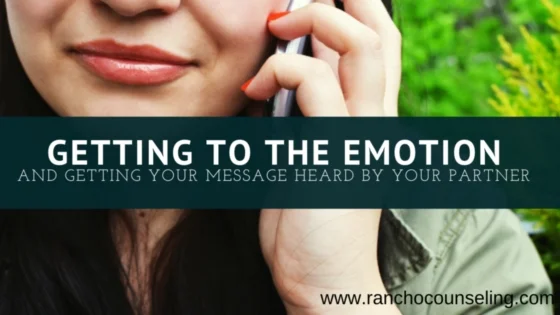
Blog
Getting to the emotion and Getting your message heard by your Partner
When you’re going through it with your partner, and there’s an ongoing argument or issue, it can be so easy to get caught up in the words that are being said. You might start an argument about something that was said that didn’t sit well with you, but end up dissecting the words, or focusing on the time and place an incident happened. But where did you go wrong?
When you’re going through it with your partner, and there’s an ongoing argument or issue, it can be so easy to get caught up in the words that are being said. You might start an argument about something that was said that didn’t sit well with you, but end up dissecting the words, or focusing on the time and place an incident happened.
What you wanted to talk about doesn’t get addressed, and you end the argument and go to bed angry because things just weren’t going anywhere. But where did you go wrong?
If you’ve ever worked with me, you know one of my favorite questions to ask is, “but what’s the feeling behind that?” I tend to get a little excited about this question, and typically say this with emphasis because I think the answer is what leads to the magic in a relationship.
It’s the key to truly getting your message heard, and getting a response from your partner that may change the course of an argument, and a skill that can change how you fight in the future.
When you begin an argument with your partner, the way that you engage in that argument can happen in many different ways. Couples tend to do a sort of dance, where their arguments take on a familiar pattern.
Your pattern might be: I’m angry with my partner for (fill in this blank with something like, I’m feeling ignored in the relationship), so I’m going to pick a fight about (fill in the blank here with something completely unrelated, such as not putting the laundry in the dryer), your partner engages in this unrelated argument, and you take this as an opportunity to fight about the laundry, but also throw in a piece about feeling ignored. Your partner ignores the part about being ignored, and becomes upset because he/she’s tired of being criticized. You both become tired of arguing. No solution is reached, and you go to bed angry because you’ve run out of things to say. In the morning you go about your days, hardly saying a word, and as the day goes on, you forget about the argument and go back to business as usual.
In this scenario, the issue that was really bothering you was never addressed or even really discussed with your partner. When you don’t get the things that bother you addressed or resolved in your relationship, it becomes like a thorn in your side, and can cause that dirty little word – resentment.
The land of resentment is a dangerous place to be in your relationship because it greatly impacts the way you love and interact with your partner, and it can sometimes be difficult to initially detect.
Avoiding Resentment by getting to the feeling
Let’s go back and redo that argument in a more productive way: I’m angry with my partner for (fill in this blank with something like, I’m feeling ignored in the relationship), so I’m going to address the issue head-on, you engage your partner in a conversation where you talk about feeling ignored in the relationship, and how it makes you feel. Instead of picking an argument about something unrelated, you get to the feeling and say something like, “I’ve been feeling sad lately, and like I’m being ignored by you. This makes me feel like I’m not important to you.”
Going to the feeling, and openly sharing that with your partner gives them the opportunity to respond to your emotion. In 99% of cases, your partner isn’t trying to hurt your feelings, and will respond with concern when given the opportunity. This opens up an opportunity for you to make a request about their behavior moving forward, and clarify what you need.
Simple, right? While it’s easy for me to write out this simple formula, it’s often more difficult to do and takes practice. It’s easy to get caught up in building your argument, and fear of vulnerability sets in at times when you get to the point where you share your feelings. But my hope is that you can ask yourself, “what’s the most important thing that I need to communicate to my partner in this scenario?” Hint: it’s your feeling behind what’s happened; the emotion it’s evoked.
If you find that you get caught up in other things and have difficulty understanding and getting to your feelings, I’d love to help. Couples counseling can be a great way to improve your communication skills together, and get your relationship back on track. Give me a call at (909) 226-6124 for a free consultation.


